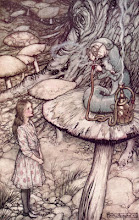Notes on “Behind the Screen Door” by Arnold Aronson
-In sitcoms, the conflict of each episode is introduced through a doorway
-In all performance media, doors pronounce entrances and exits, thus adding to the rhythm of the piece
-passage through a doorway represents transition of a character, both personal and relative to surrounding action
-3 aspects of the door:
1)how do doors onstage contribute to tragedy?
2)why are doors in sitcoms left unlocked?
3)is there a difference between TV doors and doors onstage?
-there were no doors used in ancient greek theatre, possibly b/c of the lack of privacy and supposed secrecy in greek civilization
-addition of doors to the stage implied an outside world and unseen actions that existed behind the door, beyond the stage
-boundaries onstage denote personal boundaries as well as limitless possibilities and the things that restrict us
-460 b.c.e., first door used onstage in Aeschylus' trilogy The Oresteia, first time that any sort of structure was called for in theater
-greek chorus provided rhythm of the play by coming in at beginning and end and during meaningful intervals in the performance (rather than the door)
-provides everything that the door can, except surprise
-w/o doors, everything must happen in real time, onstage. w/ doors, time may be telescoped
-the anticipation and imagining of horror is greater than seeing a representation of it
-doors introduced illusion to the theater (rather than simple artistic representation)
-as part of architecture, a door is theatrical; as part of the scenery, it is illusionistic
-Restoration England, there was one pair of doors on either side of the stage
-cultural practice to step over sill, bad luck to break threshold b/c there is a dangerous balance between our two worlds
-tragedy, doors are gateways for death; comedy, doors are gateway for chaos
-relevance of the symbol of the door has been threatened by faded boundary between reality and subconscious
-doors in TV are different b/c objects in situations on TV aren't fixed, unlike in theater, where there is a specific space that is limited in its ability to change
-comedy relies on the element of surprise/punchline delivered by a door
-the instability of an image on TV eliminates the aura that is created by theater's shared space
-reminds audience that what is being seen on the screen is analogous to what is being lived in
Friday, April 17, 2009
Subscribe to:
Post Comments (Atom)

No comments:
Post a Comment